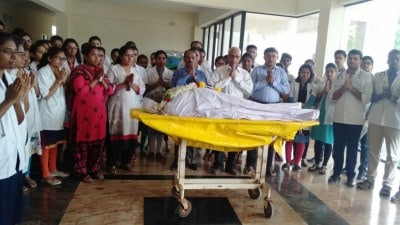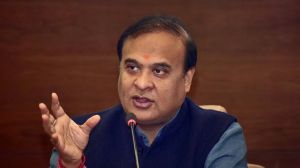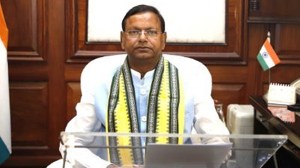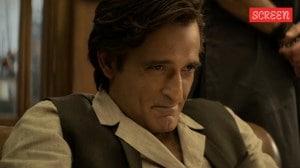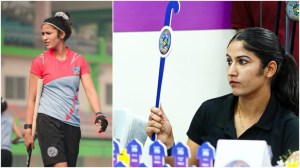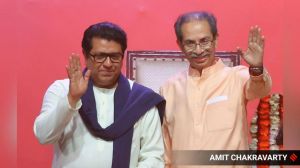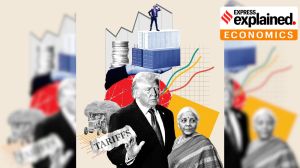The three obstructors
The resignations of the Gujarat duo, Union minister Harin Pathak and state minister Ashok Bhatt, have revived questions about the continua...

The resignations of the Gujarat duo, Union minister Harin Pathak and state minister Ashok Bhatt, have revived questions about the continuance in the government of the Babri Masjid trio: Union cabinet ministers L.K. Advani, Murli Manohar Joshi and Uma Bharati. Their own party president Bangaru Laxman fuelled the controversy by holding out the prospect of their following suit if and when charges are framed against them as well.
Laxman8217;s statement to a TV channel was subsequently sought to be downplayed as it was actually a deviation from a clever and self-serving distinction made long ago by the BJP between the Ayodhya case and the Hawala case. Advani was involved in both. The Hawala case, registered in 1996, prompted Advani to quit his Lok Sabha seat and withdraw from the electoral fray amid much drama. He contested the 1998 elections as he had by then been discharged from the Hawala case by the Delhi High Court. Luckily for him, the Supreme Court upheld the high court verdict days before he was due to be sworn in for the first time as home minister. But Advani has not shown any such concern about the Ayodhya case, which is still pending against him. The position he has maintained on the Ayodhya case is that it is a quot;purelyquot; political case. He has been blase about it because, according to him, the Ayodhya case does not suggest any quot;moral turpitudequot; on his part unlike the corruption allegation against him in the Hawala case.
The argument seeking to reduce the Ayodhya outrage to a so-called political case may sound reasonable, especially when it comes from Advani8217;s mouth. But in reality it is no different from the kind of extra-legal justification that Pakistan offers when it describes the terrorists in Kashmir as jehadis or freedom fighters. Or the gloss that the Naxalites put on their ever-increasing attacks on the poor in Andhra Pradesh by branding their victims as agents of the class enemies. It is as if a change in terminology is enough to detract from the gravity of the crimes in question. Mercifully, the rule of law does not recognise any ideological defence of the killings of innocent people. Yet, Advani has not been booked anywhere in the country for the killings that followed his Rath Yatra and the Ayodhya demolition. All that he has been booked for is just the demolition. And having dismissed even that as a mere political case, Advani apparently feels no obligation to abdicate any public office for it.
This despite a damaging observation recorded against him and other leaders by the special court in Lucknow dealing with the demolition case. After hearing counsel from both sides on the chargesheet filed by the CBI, the special court judge, J.P. Srivastava, held in September 1997 that he found quot;a prima facie case to chargequot; Advani and others. While giving his prima facie finding, Srivastava did not formally frame charges against any of the accused because of a procedural requirement. The charges can be framed only in the presence of the accused concerned. Srivastava, therefore, issued summons to all the 49 accused, including Advani, for the framing of charges.
But, as it happened, the accused leaders kept away from the court and ensured that Srivastava never got around to completing the formality of framing the charges. They could do so on the strength of an order from the Allahabad High Court staying the operation of the summons issued for the framing of charges. Thanks to that stay order, the trial that was set to proceed against Advani and others for the demolition has proved to be a non-starter. Meanwhile, Srivastava was transferred from the special court. His transfer is a setback to the prosecution. Since his prima facie finding could never be translated into charges, his successor, S.K. Shukla, has the opion of hearing arguments on the CBI chargesheet all over again. Had Srivastava been allowed to complete the formality of framing the charges, his successors would not have been able to reopen that issue.
The prolonged stalemate is thus the handiwork of the accused leaders themselves. But that did not stop them from deriving political mileage out of the fact that the charges were yet to be framed against them. In the interface between politics and law, the finer details are often a casualty. The picture on the surface is all that matters. It is true that, unlike Pathak and Bhatt, none of the three cabinet ministers in the Vajpayee government has yet been charged by the court. But what has been glossed over is a far more significant fact: That the court has already found them prima facie guilty of grave charges ranging from making imputations prejudicial to national integration and promoting enmity between Hindus and Muslims to rioting and committing acts intended to outrage religious feelings of the Muslims. The wealth of details that Srivastava8217;s 61-page order contains undermines the ruling party8217;s contention that the demolition was not due to any conspiracy but the spontaneous outburst of the kar sevaks. Noeffort is being spared to ensure that the case does not reach its logical conclusion.
The court has already found them prima facie guilty of grave charges.
- 01
- 02
- 03
- 04
- 05


